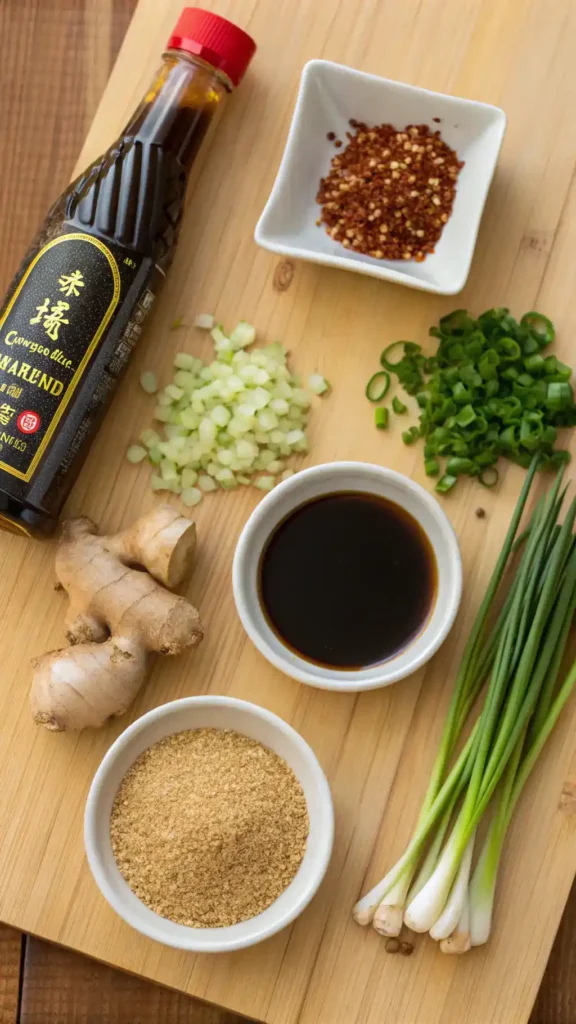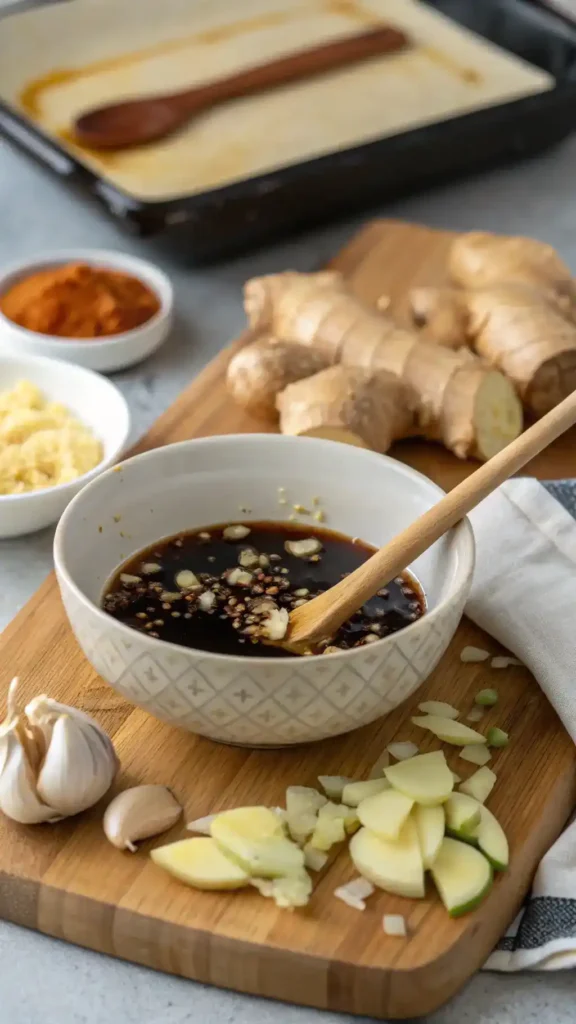Hibachi sauce recipe is your ticket to elevating any meal with a burst of savory goodness! This delightful blend of soy sauce, ginger, garlic, and a hint of sesame oil creates a tantalizing dip that dances on your taste buds. Perfect for grilled veggies, chicken, or seafood, this sauce brings that authentic hibachi experience right to your kitchen. With a touch of sweetness from honey and a splash of rice vinegar, every bite becomes a celebration of flavor. Get ready to drizzle, dip, and savor the magic of hibachi at home!
Table of Contents
Table of Contents

hibachi sauce recipe
Ingredients
Base Ingredients
- 1/2 cup Soy Sauce A savory base that adds depth and umami flavor.
- 1/4 cup Water To dilute the soy sauce.
- 2 tablespoons Brown Sugar Balances the saltiness of soy sauce with a touch of sweetness.
Flavoring Ingredients
- 1 teaspoon Garlic Powder Brings a punch of flavor and aroma.
- 1 teaspoon Ground Ginger Adds a zesty kick and warmth to the sauce.
- 1 tablespoon Sesame Oil Provides a rich, nutty aroma and flavor.
- 2 tablespoons Green Onions Chopped for garnish and added flavor.
- 1/2 teaspoon Red Pepper Flakes Optional, for those who like a bit of heat.
Instructions
Gather Your Ingredients
- Collect soy sauce, water, sugar, garlic powder, and ginger. Don’t forget the sesame oil!
Mix the Base
- In a bowl, combine 1/2 cup of soy sauce and 1/4 cup of water. Stir well to blend.
Sweeten It Up
- Add 2 tablespoons of sugar to the mixture. Stir until the sugar dissolves completely.
Spice It Up
- Sprinkle in 1 teaspoon of garlic powder and 1 teaspoon of ground ginger. Mix until well combined.
Add the Flavor
- Drizzle in 1 tablespoon of sesame oil for that nutty flavor. Stir again to incorporate.
Taste and Adjust
- Give your sauce a taste. Feel free to add more sugar or soy sauce to suit your preference!
Store or Serve
- Transfer the sauce to a jar or container. Use it right away or refrigerate for later!
Enjoy!
- Drizzle your homemade hibachi sauce over grilled veggies, meats, or rice. Enjoy the burst of flavor!
Why You’ll Love This Hibachi Sauce Recipe
- It’s a quick and easy way to elevate your meals.
- Perfect for dipping, drizzling, or marinating.
- Made with simple ingredients you probably already have.
- Customizable to suit your taste preferences.
- A delicious way to bring a taste of Japan to your kitchen.
Recipe Snapshot
| Feature | Details |
|---|---|
| Category: | Dipping Sauce |
| Cuisine: | Japanese |
| Prep Time: | 10 minutes |
| Cook Time: | 0 minutes |
| Total Time: | 10 minutes |
| Dietary: | Gluten-Free, Vegan |
| Serves: | 4 |
| Best Served: | With grilled meats and vegetables |
Ingredients for Hibachi Sauce Recipe
- Soy Sauce – a savory base that adds depth and umami flavor.
- Mirin – a sweet rice wine substitute that enhances sweetness; use a splash of rice vinegar if avoiding alcohol.
- Sesame Oil – provides a rich, nutty aroma and flavor; a little goes a long way.
- Garlic – fresh or powdered, it brings a punch of flavor and aroma.
- Ginger – fresh or ground, it adds a zesty kick and warmth to the sauce.
- Brown Sugar – balances the saltiness of soy sauce with a touch of sweetness.
- Green Onions – chopped for a fresh, crisp garnish and added flavor.
- Red Pepper Flakes – optional, for those who like a bit of heat in their sauce.

Ingredients with measurements will be right under the article in the recipe card.
How to Make the Hibachi Sauce Recipe
Get ready to whip up a delicious hibachi sauce that will elevate your meals!
Step 1: Gather Your Ingredients
Collect soy sauce, water, sugar, garlic powder, and ginger. Don’t forget the sesame oil!
Step 2: Mix the Base
In a bowl, combine 1/2 cup of soy sauce and 1/4 cup of water. Stir well to blend.
Step 3: Sweeten It Up
Add 2 tablespoons of sugar to the mixture. Stir until the sugar dissolves completely.
Step 4: Spice It Up
Sprinkle in 1 teaspoon of garlic powder and 1 teaspoon of ground ginger. Mix until well combined.
Step 5: Add the Flavor
Drizzle in 1 tablespoon of sesame oil for that nutty flavor. Stir again to incorporate.
Step 6: Taste and Adjust
Give your sauce a taste. Feel free to add more sugar or soy sauce to suit your preference!
Step 7: Store or Serve
Transfer the sauce to a jar or container. Use it right away or refrigerate for later!
Step 8: Enjoy!
Drizzle your homemade hibachi sauce over grilled veggies, meats, or rice. Enjoy the burst of flavor!

Pro Tips for Making the Hibachi Sauce Recipe
- Use fresh ingredients for the best flavor; fresh garlic and ginger make a big difference.
- Adjust the soy sauce to your taste; low-sodium options are great for a healthier twist.
- For a little kick, add a dash of sriracha or red pepper flakes to the mix.
- Let the sauce sit for at least 30 minutes before using; this helps the flavors meld beautifully.
- Experiment with different oils; sesame oil adds a lovely nutty flavor to your sauce.
How to Serve Hibachi Sauce Recipe
- Drizzle over grilled chicken or shrimp for a zesty kick.
- Use as a dipping sauce for fresh veggies or tempura.
- Mix into stir-fried vegetables for an extra flavor boost.
- Pair with rice or noodles for a delicious, savory meal.
- Spread on a sandwich or wrap for a unique twist.
- Combine with tofu for a tasty vegetarian option.
- Serve alongside sushi rolls for a delightful contrast.
Make Ahead and Storage
Storing Leftovers
• Allow the sauce to cool completely before storing.
• Transfer to an airtight container.
• Store in the refrigerator for up to one week.
• Label the container with the date for easy tracking.
Freezing
• Pour the sauce into freezer-safe containers or bags.
• Leave some space at the top for expansion.
• Seal tightly to prevent freezer burn.
• Freeze for up to three months for best quality.
Reheating
• Thaw in the refrigerator overnight before reheating.
• Heat gently on the stove over low heat, stirring frequently.
• Add a splash of water or broth if the sauce is too thick.
• Taste and adjust seasoning as needed before serving.
FAQs
What can I use as a substitute for soy sauce in this hibachi sauce recipe?
If you’re looking for a soy sauce alternative, try using tamari or coconut aminos. Both options provide a similar umami flavor without the gluten found in traditional soy sauce, making them great for those with dietary restrictions.

